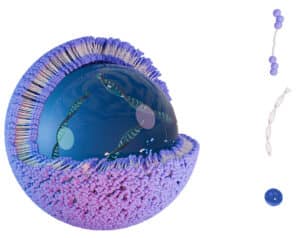
Pulmonary Drug Delivery
Delivering medications directly to the lungs remains a significant challenge due to natural lung defenses like mucus barriers and immune responses. Existing nanocarriers often face clearance before reaching their intended targets, leading to inconsistent dosing and unpredictable therapeutic outcomes. These limitations highlight the need for innovative solutions to enhance the precision, stability, and efficacy of nanocarrier-based treatments for pulmonary conditions.
These limitations are particularly critical for treating chronic respiratory conditions like cystic fibrosis and COPD, where targeted and efficient drug delivery is essential for managing symptoms and slowing disease progression. Better lung delivery systems could also expand treatment options for systemic conditions. To truly revolutionize care, there’s a pressing need for nanocarriers that can safely and effectively transport a wide range of drugs, including large molecules and poorly soluble compounds.
Lung Delivery
Phoreus’ peptide-based nanocarriers (PNPs) provide an innovative approach to delivering a wide range of medications and therapies to the lung, aiming to overcome key challenges associated with traditional nanocarriers. Designed for higher biocompatibility and faster metabolization, PNPs aim to reduce the risk of toxicity and immune reactions, supporting their potential for safer and more effective pulmonary delivery. Their unique structure is designed to support cellular uptake, helping therapeutic cargo reach its target more effectively.
PNPs are being explored for their potential to enhance pulmonary delivery by improving drug stability and cellular uptake. Our research to date has shown promise in:
- Delivering small molecule cargo into bronchial epithelial cells.
- Administering mRNA in vivo using freeze-dried PNPs.
- Transporting nanocarriers through human bronchial epithelial cell layers in cystic fibrosis models.
These findings indicate PNPs may provide an alternative approach for addressing challenges in lung drug delivery.
Technology Description
Amphipathic Peptide Capsules (APC®) are being explored as a novel class of nanocarriers designed to facilitate the encapsulation and cellular uptake of nucleic acids and water-soluble compounds. Researchers are investigating APC®’s potential to penetrate mucosal membranes, which could support the development of future therapeutic delivery systems, including for respiratory conditions such as cystic fibrosis.
Early studies suggest that APC®’s high positive surface charge may aid in intracellular delivery. Its surface structure is designed to allow for the attachment of targeting moieties, which could help direct active ingredients to specific cells.
As research continues, APC® may provide a platform for further exploration into its potential applications, helping to bridge in vitro studies with in vivo research.